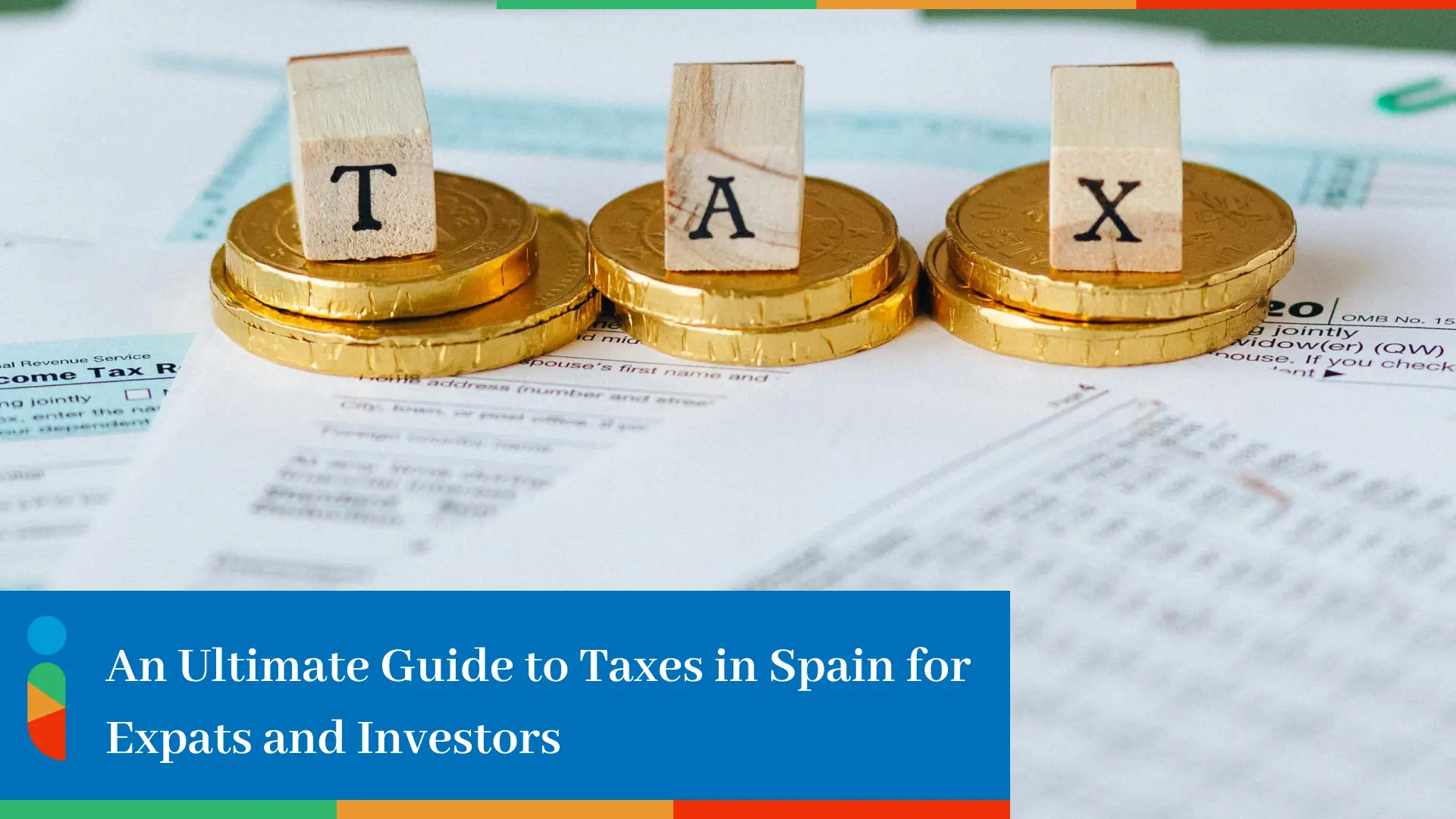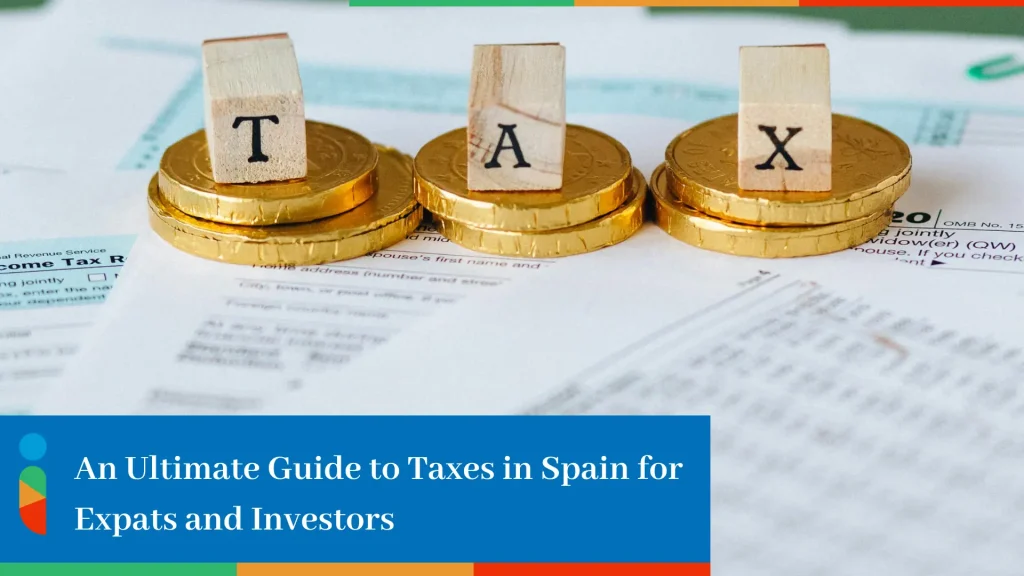Are you an expat who wishes to settle down in Spain? An investor who is eyeing the real estate here? Or are you one of the up and coming ambitious entrepreneurs who is considering the country an ideal place for launching their startup?
Then knowing how the Spain tax brackets work, what is residency status, and how you can ensure your compliance are some of the most important matters.
In this blog post, we cover it all. From tax residency and income brackets to corporate levies and exemptions, we discuss everything there is to know. And no, we don’t forget about that dreaded paperwork either!
Understanding Tax Residency in Spain
Before you calculate a single euro in taxes, there is another thing you need to do first. You have to determine your tax residency status.
Spain distinguishes between its tax residents and non-residents. And that classification? It drives everything, including:
- What income gets taxed
- Which forms to file
- How much you pay
The tax office doesn’t just take your word for it either. They apply specific criteria to determine where your fiscal loyalty lies.
Who Qualifies as a Tax Resident?
So, what makes you qualify as a tax resident in Spain? You are one, if any of these following points apply to you:
- You spend more than 183 days in Spain during a calendar year. No, these days don’t have to be consecutive either. Your hotel receipts and credit cards can affirm the number of days of your stay in the country.
- Your primary professional or economic interests lie here. Precisely, your job, business, or investments are based in Spain.
- Your spouse and dependent minor children habitually live here.
Now, if any of the above apply, it means you are a tax resident. This status means you are going to be subject to taxation on your worldwide income, instead of your earnings within Spain.
Key Differences Between Non Resident vs. Resident
Your tax residency status imply significantly different things:
Residents
They are taxed on their global income. Residents also need to file their annual declarations and can claim deductions, allowances, and benefits. If you are a resident, you are also subject to wealth and inheritance taxes.
Non Residents
They are taxed only on Spain sourced income. It is generally subject to flat tax rates, with fewer deductions and obligations. If you are a non-resident, it’s highly likely you will be required to appoint a fiscal representative in Spain.
Dual Residency and Tie Breaker Rules
When someone qualifies as a tax resident in both Spain and another country, double tax treaties (DTAs) apply. The OECD’s tie breaker criteria are used to resolve conflicts:
- Where you have a permanent home
- Location of personal and economic interests
- Where you habitually reside
- Your nationality
- Mutual agreement between the two countries’ tax authorities
These agreements help prevent double taxation. Although they require being diligent in filings and documentation.
Spain Income Tax System: An Overview
Spain operates on a progressive tax model, meaning the higher your income, the more tax you pay. Personal income tax is split between national and regional components. Your effective tax rate will vary depending on which autonomous community you reside in.
Spain Income Tax Brackets 2025
Here are the national tax brackets for 2025:
- Up to €12,450: 19%
- €12,451 to €20,200: 24%
- €20,201 to €35,200: 30%
- €35,201 to €60,000: 37%
- €60,001 to €300,000: 45%
- Over €300,001: 47%
Regional tax rates are then layered on top. As a result, your total tax rate might be higher or lower depending on where you live.
Regional Variations in Tax Rates
Spain’s 17 autonomous communities, including Catalonia, Andalusia, and Madrid, have the power to set their own rates for the regional portion of income tax. For example:
- Madrid has among the lowest personal income tax rates in Spain.
- Catalonia applies one of the highest regional tax surcharges.
- Andalusia recently reduced regional taxes to attract more residents and businesses.
Understanding these differences is key to accurate tax planning, especially if you have flexibility about where to live.
Are Taxes High in Spain Compared to Other Countries?
Spain’s income tax rates are in line with other developed European nations. While some expats feel the pinch due to a lack of familiarity with the system, Spain offers solid value in return. The tax revenue here supports:
- Public healthcare
- State pension systems
- Free or affordable education
- Reliable infrastructure and public transportation
Taxes can seem high comparatively with other countries, depending on your overall income and lifestyle. But once you factor in the benefits and the average salary in Spain, the tax load seems to be every bit reasonable.
Other Personal Taxes in Spain
Spain levies several other personal taxes, some of which can catch expats by surprise. These include capital gains, wealth, and inheritance taxes.
Capital Gains Tax
Capital gains tax (CGT) applies when you sell property, stocks, or other assets. The rates are:
- Up to €6,000: 19%
- €6,001 to €50,000: 21%
- €50,001 to €200,000: 23%
- €200,001 to €300,000: 27%
- Over €300,000: 28%
If you reinvest gains in a new primary residence, you may be eligible for exemptions, especially if you are over 65.
Wealth Tax
Wealth tax applies if your net assets exceed €700,000, excluding your main home (up to €300,000 exempt). Rates are progressive, from 0.2% to 3.5%.
Some regions offer exemptions or apply reduced rates, but others (like Catalonia) are stricter in enforcing the tax.
Inheritance and Gift Tax
Spain taxes both gifts and inheritance. And these rules vary wildly by region. There are various factors that influence how much tax you owe, including:
- Your relationship to the deceased or donor
- The value of the gift or inheritance
- The region where the assets are located
Close family members often receive generous deductions. But this isn’t something universal.
Taxation for Property Owners and Investors
Spain is a popular market for property investment, especially in tourist hotspots. But taxes related to property can be substantial, so it’s important to budget accordingly.
VAT and Transfer Tax on Property Sales
- New builds are subject to 10% Spanish VAT rate
- Resale properties have a transfer tax of 6% to 10% imposed, depending on the region
Other costs such as stamp duty, legal fees, and notary services can add another 2% to 3%.
Local Property Taxes (IBI) and Capital Gains on Sales
IBI is a local tax paid annually. It is based on the cadastral value of the property. Sellers also have to pay:
- Capital gains tax based on the appreciation since purchase
- Plusvalía municipal, a local tax on land value increases
Rental Income Taxes for Residents and Non Residents
- Residents should declare their rental income as part of general income and can deduct costs like mortgage interest, repairs, and agency fees.
- Non residents are taxed at a flat 24% on gross income. If you are an EU or an EEU resident, that would be 19% for you. There are no deductions though, unless it has been covered under a treaty.
Corporate and Startup Taxes in Spain
Spain offers a relatively straightforward corporate tax structure. Plus, there are several incentives involved for small businesses and startups.
Corporate Tax Rates
- Standard rate is 25%
- The rate for startups is 15% for the first two profitable years
- For financial institutions and energy companies, the corporate tax rate is 30%
Special Incentives and Reliefs
- Beckham Law is for attracting foreign professionals with a flat 24% tax on Spanish income
- Andalusia incentives offer tax breaks for companies relocating to southern Spain
- SME deductions are available to small and medium enterprises
How to File Taxes in Spain
Filing taxes in Spain can be a challenge. Especially if you don’t speak Spanish or if you are not familiar with the system. Still, compliance is necessary. These are some major points that you should know:
Tax Deadlines and Forms
- IRPF declaration is the annual filing between April and June
- Form 100 is used for personal income tax
- Modelo 720 is mandatory declaration of overseas assets if they exceed €50,000
Late or incorrect filings can trigger steep penalties.
How to Pay Taxes in Spain
Taxes can be paid via:
- Online using the Agencia Tributaria portal
- At authorized banks
- Through direct debit or with the help of a tax agent
Hiring a Tax Consultant or Gestor
Regional rules, language barriers, and complex forms have many expats relying on a tax advisor or gestor. If you work with an employer of record in Spain, they might provide some form of tax support or referrals.
Double Taxation Agreements (DTAs)
Spain has DTAs with over 90 countries to help individuals avoid double taxation and reduce tax burdens.
How DTAs Protect Expats
- The credit method offsets foreign tax paid against Spanish liability
- With exemption method, some income is excluded from Spanish taxation
- Treaties often define income types like pensions, dividends, and employment earnings
Most Common Countries with DTAs
Some of Spain’s most used DTAs are with:
- United States
- United Kingdom
- France
- Germany
- India
Planning on setting up a company in Spain? A DTA with your home country may impact your structure and tax strategy.
Exemptions, Deductions, and Allowances for Expats
The Spanish tax system provides various ways to reduce your tax burden if you know where to look.
Personal Allowances and Deductions
- Child allowances and dependent care deductions
- Spousal support or contributions to family units
- Mortgage interest on main residence
- Charitable donations
- Pension contributions
Capital Gains Exemptions for Over 65s
Seniors, of 65+ years age, who sell their main residence after living there for at least three years may be exempt from capital gains tax. This can significantly lower your overall tax exposure.
Beckham Law for Foreign Workers
Available to qualifying foreign professionals. Offers:
- Fixed 24% tax on Spanish income up to €600,000/year
- Exemption from taxation on foreign income
- Valid for six years
Common Tax Mistakes Expats Should Avoid
These are some mistakes you should watch out for:
- Not declaring your overseas accounts or property
- Missing deadlines, especially for Modelo 720
- Assuming tax treaties apply automatically
- Ignoring regional tax differences
- Not keeping documentation of deductible expenses
Final Thoughts: Navigating the Spanish Tax Landscape
Taxes in Spain are layered and detailed, but with a bit of knowledge and preparation, they are manageable. Whether you are living in Spain long term or investing from abroad, knowing your obligations helps you avoid fines and make the most of tax benefits.
Need help streamlining compliance, payroll, and filings? Iberia’s EOR services simplify the back office burden so you can focus on what matters.
FAQs
How Do I Pay Taxes in Spain as An Expat?
You can pay your taxes via the Agencia Tributaria website, through authorized banks, or using a local tax consultant.
Are Taxes High in Spain Compared to Other European Countries?
The taxes are usually in the mid to high range.
What Are the Spain Tax Brackets in 2025?
They range from 19% to 47%, plus regional surcharges.
Do I Have to Declare Income Earned Outside Spain?
Yes, if you are a tax resident. Global income must be declared, with possible relief via DTAs.






